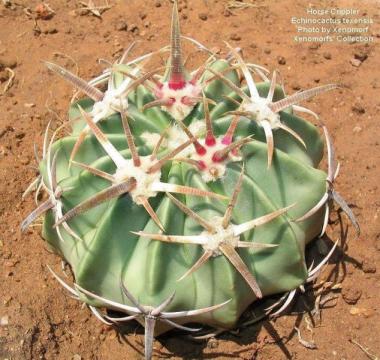John Poch authored Horse Crippler (Echinocactus texensis) which appeared in North American Review, Volume 303.4. John gives us a background on this unusual plant which served as inspiration for his poem in today's blog post.
The Horse Crippler is a plant not many people experience. That’s mostly a good thing. Its awful 1-2 inch sturdy spines look like tiny alien/dinosaur horns.
I’m not sure if it could literally cripple a horse, but nobody would want to step on this thing. You rarely see them, as the plant itself only grows a few inches off the ground. When it blooms in early spring, it produces uniquely beautiful, pink flowers that only last a day or two. Its fragrance and/or nectar, I have noticed, attracts a specific kind of small bee. I’m not sure what it is. There are limits to my curiosity. And then if that flower gets pollinated, it turns into a gorgeous bright dark-pink ping-pong ball fruit a coyote might eat. I enjoyed writing that almost as much as I enjoy the sound of the words “horse crippler”. When I was in college, studying nuclear engineering, I knew I should study poetry when I realized I liked the sound of the phrase “lumped burnable poisons”. When I meditate upon the Horse Crippler’s beauty, I think how for years I felt Texas was crippling me, but I learned over time to love its harsh beauty unlike anything you will find in the world. This plant’s Latin name is fittingly Echinocactus Texensis.
a few inches off the ground. When it blooms in early spring, it produces uniquely beautiful, pink flowers that only last a day or two. Its fragrance and/or nectar, I have noticed, attracts a specific kind of small bee. I’m not sure what it is. There are limits to my curiosity. And then if that flower gets pollinated, it turns into a gorgeous bright dark-pink ping-pong ball fruit a coyote might eat. I enjoyed writing that almost as much as I enjoy the sound of the words “horse crippler”. When I was in college, studying nuclear engineering, I knew I should study poetry when I realized I liked the sound of the phrase “lumped burnable poisons”. When I meditate upon the Horse Crippler’s beauty, I think how for years I felt Texas was crippling me, but I learned over time to love its harsh beauty unlike anything you will find in the world. This plant’s Latin name is fittingly Echinocactus Texensis.
A few years ago, I dug one up from down in Junction, Texas (no one would miss it), where I was teaching, and brought it back to Lubbock where I put it in a pot. In the winter, I didn’t want to bring it inside, so I buried it in the ground up to its spines. One day in spring, I suppose when it was in blossom, someone came down my alley in a car, got out, and stole it. Dug it right out of the ground, pot and all. I figure this person has brought some kind of special curse upon himself.



